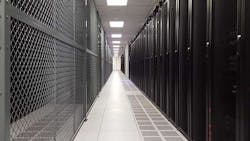The Data Center Frontier Executive Roundtable features insights from industry executives with lengthy experience in the data center industry. Here’s a look at the insights from Rich Okoney of JLL.
Rich Okoney is Global Operations Lead, Data Centers & Critical Environments for JLL. He has spent over 25 years of his professional career managing the maintenance, operations, construction and engineering of critical facilities, data centers & large global facilities management portfolios. Rich Okoney was with Johnson Controls GWS since 2001 and transferred to CBRE in 2015 where he held senior management roles directing the business and operations of large data center portfolios that contain sites ranging in various tier and infrastructure design. Most recently, as Executive Director- Global Head of Data Centers for JLL, Rich leads the Data Center and Critical Environments COE with primary focus on operational delivery, risk mitigation, reliability and compliance at our customer’s most critical portfolios. In addition, he is responsible for developing creative and innovative strategies and programs to enhance overall operations and provide successful client outcomes. Rich is also responsible for overall client satisfaction, business development and business/operational strategy.
Here’s the full text of Rich Okoney's insights from our Executive Roundtable:
Data Center Frontier: Recent earnings reports suggest the growth rate of cloud computing has moderated slightly. What’s your take on the progress of cloud computing – the “what inning are we in” question – and what lies ahead?
Rich Okoney, JLL: During the past 10 years, we’ve witnessed a perfect storm of exogenous forces that have driven massive global “cloud” adoption; the demands of 4th Industrial Revolution’s data-centered economy, unscalable and aging corporate mechanical/electrical infrastructure, and audit-driven end-to-end CSP security.
Global enterprises and governments have migrated vast chunks of infrastructure to external data centers. If data centers are not part of your core value chain and you haven’t moved at least some of your commodity storage to an infrastructure provider, the data say you may not be able to compete as efficiently in this digitally transformed economy. In parallel, during the same time, companies leveraging cloud infrastructure have filled the list of top-10 global companies (by market capitalization) - AAPL, MSFT, GOOG, META, AMZN.
Meanwhile, each progressive generation becomes more digitally native, consuming and creating an increasing amount of content, all stored in “the cloud”, or, the data centers of the same companies. So, while many enterprises have started or completed their digital transformation with its accompanying cloud computing component, the growth of both commercial and personal data creation and preservation continues to advance rapidly.
If new forces like virtual services that are truly ready for production use and the proliferation of AI drive new storage/compute demands, we could see even a greater trajectory. We’re still in the ‘early innings’ and there’s still a lot to come, in defining how cloud computing will be further optimized in the next 3 to 5 years. Stay tuned.
Data Center Frontier: How would you assess the state of the data center supply chain? What items continue to experience long lead times or availability problems?
Rich Okoney, JLL: While data center supply chain issues have seen improvements over the past year, lead times and equipment availability continue to be a substantial headwind for the industry. Specifically, sourcing electrical equipment such as batteries, switchgear and generators efficiently, is still very problematic. The availability of those products is running 6-12 + months. This is largely being driven by raw materials shortages which are used to manufacture equipment. IT infrastructure is another area being affected. Instead of weeks to get these specific components, it often takes months.
Continued friction in the supply chain is leading to rising costs in the overall cost of data center expansions, upgrades and new builds.
I see these persistent challenges leading to more adaptations in supply chain strategies. Not only is equipment being ordered far in advance of the anticipated need, but I’m also seeing companies partnering and pooling their orders to get more favorable positions in delivery times. Overall, I expect to see some ‘spot’ improvements in certain categories, while others are still going to continue experiencing long lead times well into 2024.
Data Center Frontier: Data centers have always been highly-automated facilities. What are the most promising opportunities in automation and data center management? Can AI, augmented reality, and robots play a meaningful role?
Rich Okoney, JLL: I believe so. There’s a tremendous amount of untapped potential that can be deployed in robotics, AI and AR in the next five years and beyond. Specifically, with AR, which is already being deployed across many organizations in facility operations and for optimizing training. Augmented reality can be a very effective tool in data center operations as it relates to predictive maintenance, agility in technical training and even incorporating analytics into the platform.
There’s been a tremendous amount of buzz around AI in recent months and it’s a technology that will clearly be a game changer across multiple industries, and even in ways we can’t predict yet. In the data center space, it probably will play a meaningful role, but the applications and innovations are still being developed and it’s too early to tell where it will make the most impact.
Data Center Frontier: The industry has stepped up its efforts to attract and retain talent, but staffing remains a huge challenge. What’s working well, and what more can be done to build a diverse workforce of the future.
Rich Okoney, JLL: The industry continues to be challenged with attracting and retaining top talent. It has forced us to be more creative in the methods used to recruit – especially technical and highly skilled team members.
At JLL we have leveraged several approaches for achieving success in this area. We continue to robustly invest in our internal technical training programs to drive higher competency for existing technicians; and for those who want to develop their expertise further and enter the data center industry.
Leveraging multiple recruiting strategies is also important so that you pull talent from areas that may not have been fully utilized in the past. Working with various military programs we’re able to bring in talent that is highly skilled and very process driven. Utilizing these military programs has enabled us to benefit from a skillset that is specialized and is a perfect fit for transitioning to a data center related career.
Additionally, we’re creating more industry awareness at the technical schools, trade programs and universities to attract more diverse talent, that may have had limited visibility into data centers and the attractive career opportunities in this fast-growth space.
About the Author




